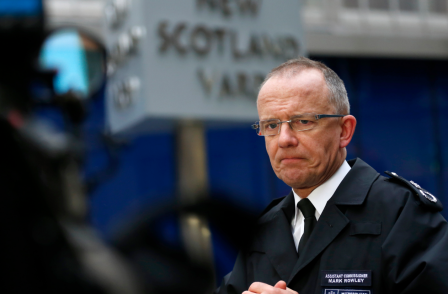
A senior Metropolitan Police officer has defended the use of spying powers against journalists saying that “nobody should be above the law”.
But assistant commissioner Mark Rowley said that there should be “good grounds” to believe someone is involved in criminality before intrusive surveillance is allowed against them.
So far Press Gazette has uncovered four instances of police using powers allowed under the Regulation of Investigatory Powers Act to spy on journalists.
In the three cases where phone records were seized – those involving the Ipswich Star, Mail on Sunday and The Sun – the journalists involved were not under suspicion of breaking the law. In the case of Milton Keynes Citizen journalist Sally Murrer, she was subject to audio surveillance under RIPA, taping her conversations with a police officer, but she was cleared at trial.
Rowley told the Today programme on Friday: “RIPA is a series of provisions which is about tackling crime. Depending how intrusive the act is that we want to do is depends on the level of authority.
“Everyone would accept that nobody should be above the law, whether it’s a member of the public, whether it’s a police officer, whether it’s a journalist, we should be able to investigate and pursue any one of those.
“That’s how these powers should be used. To be going after intrusive surveillance against a journalist there ought to be good grounds to believe they are involved in criminality.
“If Parliament were to decide there are special issues around journalistic privilege which means there needs to be new safeguards around that well that’s something for Parliament to debate.
“We will keep using the powers to chase down criminals whether they are ordinary members of the public or journalists.”
In the case of The Sun phone records of political editor Tom Newton Dunn and of the newsdesk were seized to track down three officers accused of leaking information about the Plebgate incident where then Cabinet chief whip allegedly called a police officer guarding Downing Street a “fucking pleb”.
The Crown Prosecution Service found that the officers were acting the public interest so they did not face any criminal charges, but they were sacked by the Met Police.
In the case of The Mail on Sunday, the phone records of two journalists were seized as part of an inquiry into allegations that Constance Briscoe, a former judge, had misled the police.
Officers used RIPA to obtain the phone records of Ipswich Star journalist Mark Bulstrode after he questioned the force about the re-opening of a rape investigation.
At the request of the force the paper did not report the new development, but his records were nonetheless seized and his police source was spoken to about the matter – but not disciplined.
Email pged@pressgazette.co.uk to point out mistakes, provide story tips or send in a letter for publication on our "Letters Page" blog
